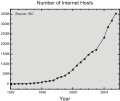User:Craig3410/nethistory
What is the internet?
[edit]Let's let Ted Stevens explain it!
History of the Internet
[edit]The internet first started out as ARPANET, a connection of military computers.
The earliest ideas of a computer network intended to allow general communication between users of various computers were formulated by J.C.R. Licklider of Bolt, Beranek and Newman (BBN) in August 1962, in a series of memos discussing his "Intergalactic Computer Network" concept. These ideas contained almost everything that the Internet is today.[1]
-
USENET
Another project closely related to the development of the internet is USENET. USENET is an interlinked group of news servers used by the general public. It was first developed in 1979 by a pair of gradutates from Duke, Tom Truscott and Jim Ellis.
The first major step in the path to the general public getting Internet access the development of the first internet service providers in the late 1980s and early 1990s, Prodigy, Compuserve and AOL. These companies, for prices of $20 or $30, would offer speeds of up to 56 kilobytes a second. (Notice that, these days, the computers in the computer labs get speeds of 15000 kb/s, and the school offers free dialup. But in the early years, people were willing to pay anything just to get what little there was on the internet!)
-
number of websites, 1992-2004
In the late-1990s, cable internet became affordable for home users, and it brought with it much faster speeds; up to 6 megabytes (6000KB) per second, as opposed to dialup's 56K per second.
Google, the main search engine (among other things) of the Internet, started out as a thesis project by Larry Page and Sergey Brin, two PH.D students from Stanford. What made them different and more efficient was that they calculated a page's importance by the number of times it is linked to in the internet.
What the Internet offers
[edit]Obviously, the Internet takes its cues from historical methods of communication; not only does it allow for the written word, like newspapers, it also offers sound Media:Messiah Hallelujah Chorus 1916.ogg and pictures
-
Albert Pujols and Ryan Howard
-
kitty
What makes it different from the other forms of communication is that the Internet is "on-demand", in other words, if you're looking for relevant information on a topic when it's not being discussed on TV or on radio, you're out of luck and must wait for the publishers to provide information when they feel like it. With the internet, however, you can simply look it up and get the information whenever you want to.
Internet problems
[edit]However, it can be argued that the Internet does its job too well; even information we'd like not to become public, can, thanks to the internet.



